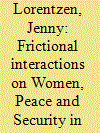| Srl | Item |
| 1 |
ID:
181833


|
|
|
|
|
| Summary/Abstract |
More than 20 years after the adoption of UN Security Council Resolution 1325 on Women, Peace and Security, the international community is concerned with taking stock of its implementation in countries undergoing transitions from war to peace. This article contributes to a better understanding of the dynamics involved in implementing the Women, Peace and Security agenda through a focus on the frictional interactions that take place between different actors promoting women's participation in the peace process in Mali. Based on extensive fieldwork in Bamako between 2017 and 2019, it analyses interactions between different international and local actors in the Malian peace process through a discussion of vertical (between international and local actors) and horizontal (between local actors) friction. It finds that the way different actors respond to friction shapes relationships and impacts norm trajectories by triggering feedback loops, which in turn trigger new responses and outcomes.
|
|
|
|
|
|
|
|
|
|
|
|
|
|
|
|
| 2 |
ID:
178084


|
|
|
|
|
| Summary/Abstract |
The frames of counterterrorism and countering violent extremism are increasingly shaping much international engagement in Mali. In this environment, women's contributions are often reduced to their peacemaking potential. This article studies how the UN policy agendas on Women, Peace and Security (WPS) and Preventing and Countering Violent Extremism (P/CVE) are translated in discourses on P/CVE in Mali. It draws on feminist and postcolonial scholarship to develop a framework for analysing how local intermediaries in norm translation engage in ‘discursive practices of re-presentation’ and conducts a discourse analysis of interviews with Malian civil society and government representatives. The analysis finds that a re-presentation of women as security actors, constructed as an extension of their roles as peacemakers, dominates the discourse. I use the term ‘new security actors’ to describe the dominant re-presentation of women that emerges in this context: a woman who will contribute to preventing radicalization and violent extremism by influencing, counselling, and/or informing on her family or community members. ‘New security actors’, however, emerges as a problematic re-presentation of women which emphasizes traditional gender roles and potentially exposes women to risks, and in many ways seem to contradict much of the normative aspirations of the WPS agenda.
|
|
|
|
|
|
|
|
|
|
|
|
|
|
|
|